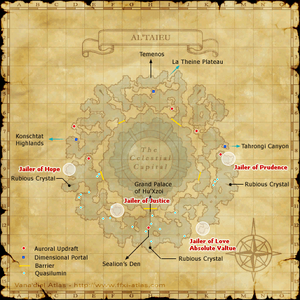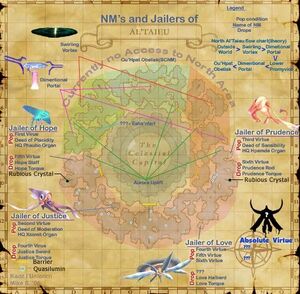Jailer of Love
| Zone | Level | Drops | Steal | Spawns | Notes |
|---|---|---|---|---|---|
| Al'Taieu | 83 | 1 | A, T(H) ??? HP ??? MP | ||
|
HP = Detects Low HP; M = Detects Magic; Sc = Follows by Scent; T(S) = True-sight; T(H) = True-hearing JA = Detects job abilities; WS = Detects weaponskills; Z(D) = Asleep in Daytime; Z(N) = Asleep at Nighttime; A(R) = Aggressive to Reive participants | |||||
Horizon Changes 
Notes
- Spawned by trading Fourth Virtue, Fifth Virtue and Sixth Virtue to a ??? at (K-12).
- It has extremely high HP and Auto Regen (200-250 HP/tick)
- Automatically despawns 2 hours after being spawned.
- Special Abilities:
- Fluorescence - Boosts attack power
- Concussive Oscillation - Smacks around all nearby targets. Additional effect: Knockback & Weight
- Primal Drill - Drills into nearby targets with appendages. Additional effect: Bind
- Luminous Drape - A glowing curtain Charms all nearby targets
- Ion Shower - AoE damage and Stun, strips Utsusemi
- It is possible for a tank to stand at the edge of the large circular hood, so that the Jailer does not melee him.
- Shield Bash and Chaotic Strike can interrupt its casting. (Shield Bash has a high rate to cancel its casting.)
- Weapon Bash has also been known to work, though slightly lower in accuracy rate compared to Shield Bash.
- Each time it summons 3 copies of one type of helper which engage the person with hate.
- After summoning three sets each of Qn'xzomit, Qn'hpemde, and Ru'phuabo, its Auto Regen is reduced to a much more manageable level, and it summons only Ru'phuabo for the remainder of the fight.
- Astral Flow causes all of its helpers to immediately perform the same TP attack. Astral Flow can be used more than once.
- Only 9 Qn'xzomit and 9 Qn'hpemde can be summoned. Ru'phuabo (Sharks) are unlimited.
- Once it is only summoning Ru'phuabo, two of the summons can be pulled apart and held, so that JoL only summons one at a time.
- Elemental weakness changes periodically, accompanied by the 2-hour "dust cloud" animation. It will only cast one element's spells at a time. Casts Tier IV nukes, Tier III ga nukes, and various -ga offensive enfeeble and dark magic spells. Nuking or Skillchaining it with its strong element will heal it.
- Enfeebling magic range is larger than tier 3 nukes.
- Possible to pull outside the circular spawning area having tanks hide behind the wall, and meleeing it without worry.
- After it is defeated, Absolute Virtue spawns shortly thereafter.
- It IS possible for both Novio and Novia earrings' auras to drop at the same time.
Dialogue
The "???" at K-12 says:
A distant voice emanates from the depths of your soul.
"Now...I...know..."
"Fourt...irtue..."
"Fif...irtue..."
"Sssix...irtue..."
"I...desssire..."
The fragmented dialogue is referring to the Fourth Virtue, Fifth Virtue, and Sixth Virtue.
Historical Background
The Heavenly Virtues
The 7 Jailers of Sea are based on the 7 Virtues. Virtue is defined as moral excellence. Virtue can accordingly be characterized as having desirable character traits, traits that direct a person to act in accord with the best possible standard. In other words, Virtues improve us towards the idealized perfection of our being. In order to be virtuous, one must continuously have virtues as habits of their character. The idea of Virtues originates with the ancient Greeks and the idea was later picked up and made a part of Christian moral theology, probably during the Medieval era. There are 2 sets of virtue: the cardinal virtues (sometimes called the classical virtues) & the theological virtues. The former originate with the ancient Greeks and the latter originates in the Bible (New Testament), specifically 1 Corinthians 13, but became popular in Medieval Christianity. The cardinal virtues are: Prudence/Wisdom, Justice, Fortitude/Courage, Temperance. The theological virtues are: Faith, Hope, Charity/Love. Together, these seven virtues were called the Heavenly Virtues or simply the Seven Virtues. The pairing of these seven virtues appeared to have originated with 13th century Christian philosopher Thomas Aquinas in his work "Summa Theologica". They became a popular element for depiction in the Medieval and Renaissance periods.
According to ancient Greek philosophy, they viewed each Virtue as being the mean on a spectrum of some characteristic. As such, each Virtue would have 2 vices associated with it, lying at the extremes of that spectrum. Note that the Virtue was the mean, not necessarily the median between both vices. According to Medieval Christian thought, these virtues are said to improve one's love of God and Man. The cardinal virtues are dispositions of one's being which govern one's actions, restrain their passions and guide their conduct in accordance with reason. The theological virtues are said to give Christians the ability to live in a relationship with the Holy Trinity. They are considered to give life to all the moral virtues (the cardinal and theological virtues). The Heavenly Virtues are generally limited to the Roman Catholic denomination of Christianity. It should be noted the Chinese, Muslim, and other cultures have different sets of virtues.
The seven Heavenly Virtues do not align up with the Seven Deadly Sins. The seven Holy Virtues (or Contrary Virtues) do though, which are: Humility (counters Pride), Kindness (counters Envy), Patience (counters Wrath), Abstinence (counters Gluttony), Chastity (counters Lust), Liberality (counters Greed), Diligence (counters Sloth).
The Virtue of Love
Love (Caritas) is one of the Virtues. It is a theological virtue. Love is feelings of affection, benevolence, and kindness towards others. Love is considered the ultimate perfection of the human spirit because it glorifies and reflects the nature of God. Thomas Aquinas called Love/Charity the greatest of the virtues. Modern translations render it as Love, but earlier translations rendered it Charity. The issue over how it should be properly translated originates with the New Testament. That collection of documents is written in Greek and the virtue is written as "agape", a Greek word for a concept that has some difficulty being translated. Agape is a divine, unconditional love, one of the four loves found in ancient Greek thought (agape, philia, eros, storge).
Charity is the Virtue that gives people the love for God and for all humanity. Charity takes the human ability to love and elevates it to the perfection of divine love. Charity is friendship, benevolence, generosity. Charity is considered the greatest of all theological virtues. It is said, "charity is patient and kind, charity is not jealous or boastful; it is not arrogant or rude. Charity does not insist on its own way; it is not irritable or resentful; it does not rejoice at wrong, but rejoices in the right. Charity bears all things, believes all things, hopes all things, endures all things" (1 Corinthians 13: 4-7). The fruits of Charity are joy, peace, and mercy, which are considered some of the gifts Charity brings. The other gifts that accompany Charity are beneficence, almsdeeds, and fraternal correction. Charity could challenge the sins of sloth and envy, as well as the vices of hatred, discord, strife, sedition, and scandal.
The concept is also rooted in ancient Greek culture. The ancient Greeks had 4 words for love: Agape, Eros, Philia, Storge. Eros referred to passionate love, which was very sensual and involved physical attraction and basal arousal, but also included what are considered the romantic parts of traditional love. The word erotic derives from this. Philia referred to friendship-love (brotherly love), specifically the bond between friends and community. Affection is a part of this. Storge refers to parental affection. The Virtue of Charity/Love originates from Agape, which referred to as divine love, a pure, idealized love. Agape could refer to a love for Truth, or when the Christians adopted the concept, a love for God. The concept of Caritas (Love/Charity) originated from this when the Greek word was translated into Latin. Note that this word has come to mean love in modern Greek (s'agapo means "I love you" in modern Greek).
In Medieval and Renaissance art, Charity is frequently depicted as a calm-expressioned woman surrounded with toddlers or cherubs and she usually has one infant suckling from her breast (usually the left breast). This manner of depiction explains why the Jailer of Love is able to summon hordes of pets, more pets (27 total) than any other monster in the game, in fact.
The Jailers of Sea
It is not clear what the proper context of the Jailers is. "Jailer of (Virtue)" can be taken two ways. First, it can imply they are the Jailer of (Virtue), imprisoning that Virtue (or more specifically, imprisoning one aspect of Absolute Virtue). This would mean they do not possess the Virtue, they jail it. Second, it can imply they are the Jailer of (Virtue), being a jailer possessing that virtue. This would mean they are a jailer which possesses the Virtue in question. In this case, they would not be jailing the Virtue in their name, they would be jailing the monster known as Absolute Virtue. The latter interpretation is more logical since each Jailer drops a weapon and a torque bearing their namesake Virtue. If they were to be jailing the Virtue in question, it would make more sense for them to drop weapons and torques not named after the virtue, like objects named after the 7 Vices or the 7 Sins. Since the title you gain for defeating Absolute Virtue is "Virtuous Saint," this is the more widely accepted context. However, the former also makes sense because if the jailer is defeated, the virtue it was imprisoning is released. Absolute Virtue, interestingly, appears to drop 7 items named after synonyms for the deadly sins. It may drop these sins because upon defeating Absolute Virtue you theoretically destroy all the virtues, leaving the only thing left to gain to be sins. It is also possible that the sins are the "chains" placed on Absolute Virtue.
- Sin of Indignation (wrath)
- Sin of Insolence (pride)
- Sin of Indulgence (greed)
- Sin of Infatuation (lust)
- Sin of Indolence (sloth)
- Sin of Invidiousness (envy)
- Sin of Intemperance (gluttony)




